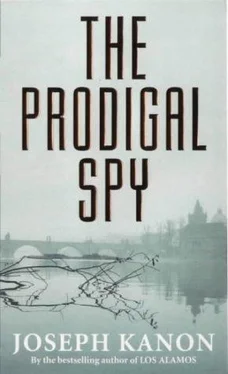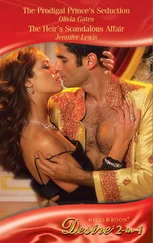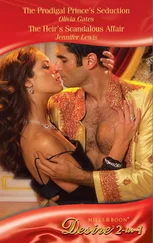“But does it matter? The fact is, they did know about her.”
“But how? Did you ever wonder why it started with her? That’s always been the strangest part of the whole business. She was the last person in the chain who’d be under suspicion. She wasn’t in the Government. No access. No history. You didn’t have to pass a security check to work at Garfinkel’s. Why investigate her? She should have been at the end of the trail, the small fry you round up with the others. But there weren’t any others. They never connected her to anybody except me. So what led them to her? How did they know to go after her?”
Molly said nothing, so Nick’s father answered for her.
“Somebody told them. That’s how it all started, all of it. That’s what I thought about on the ship,” he said, looking at her. Then he sighed, finished. “I still think about it.”
Dinner was roast pork and dumplings, whose lightness Anna demonstrated by slicing them with a string stretched taut between her forefingers, Czech style, but which then sunk back heavily in the thick gravy. Molly picked at her food, quiet and withdrawn, no longer interested in playing cat and mouse with his father. Instead she talked to Anna, complimenting her on the elaborate table setting, old china swirling with painted flowers spread across a stiff white tablecloth embroidered with gold thread.
“It’s all I kept from the house in Bubenec. My mother had three closets just for the linens. And dishes-she prided herself on her china. All the women did. Of course, they had maids. So different then. You know, I never cared about these things when I was a girl. It was just the way we lived. Now it seems so beautiful-it reminds me, I suppose. Of that life. We had a large house, a villa. A music room, even. A greenhouse in the back-we always had flowers. But that was before the war.”
“Is the house still there?”
“Oh yes. But my father was killed, so we had to leave. The Germans took it. My mother lost everything-all those closets. But she kept these.”
They were still talking about the world before Munich, all parties and piano lessons, when they heard the car in the driveway. The rain had gone, leaving only the sound of water dripping off leaves, and in the quiet the engine seemed a roar, sputtering, then stopping, unmistakably there to stay. Anna raised her eyes, her fork stalled in midair, and Nick saw that she was looking at him in alarm. He would have to be explained. The day, so placid and ordinary, had become a guilty secret. Even here, safe in the country, she was always expecting a knock on the door.
His father, seeing Nick’s face, smiled. “Don’t worry, Beria’s dead.” He got up and went over to the window, peering through the curtain. “Frantisek,” he said. Then, to Nick, “A friend. It’s all right.”
“What does he want?” Anna said, still uneasy.
“A drink. What else?” his father said lightly, opening the door.
But Frantisek had already had one. He was a bear of a man, tall and bearded, and when he entered the cottage, stooping to get through the door, his eyes had the wild, shiny look of drink. He stopped for a minute, weaving slightly, disoriented by the unexpected strangers and the formal table, then spoke to Nick’s father in rapid Czech. Without language, Nick watched them as a silent movie, forced to follow the story through gestures. He didn’t mean to break up the party. No, no, it was all right, come sit. Was something wrong? More Czech. Anna’s hand flew to her mouth in dismay, like Lillian Gish. No, his father said, then more Czech, placing his hand on Frantisek’s shoulder. At this, the tall man leaned into him, a sentimental embrace. Anna got up, then went over and led him to her chair, as if he were too upset to find it by himself. He looked at Nick and Molly and Nick saw his father introduce them. “Friends from America,” he said in English, at once a courtesy and a signal to Nick. The man nodded, too preoccupied to be curious, and the Czech began again, a volley of questions, Anna shaking her head. His father slumped into his chair, placing his hand on Frantisek’s. Anna brought out a bottle, some kind of brandy, and put it before him with a glass. Then, noticing Nick and Molly, she said, “I’m sorry. His brother has died.”
“No telephone,” the man said to them in accented English, waving his hand to take in the cottage, apparently apologizing for having come.
Nick’s father poured him a glass, then some for himself.
“A suicide,” he explained to Nick, but the man understood the word and covered his forehead with his hand, and Nick saw his eyes moisten. When he spoke, in Czech, his voice was deliberate, almost without inflection, so that again only the gestures meant anything.
Molly got up and began to clear, motioning to Anna to sit down, and Nick, excluded from the low murmur of Czech, retreated into the solemn politeness of funerals, his eyes fixed on the emptying table, the painted china removed piece by piece until there was nothing between them but white cloth and the amber bottle. The drink made Frantisek moody, and finally silent, until he sat staring at the table too.
“I’ll make some coffee,” Anna said.
Frantisek answered, but Nick’s father said to him, “In English,” nodding toward Nick.
“English, yes. Excuse me. You don’t speak Czech?”
Nick shook his head.
“It’s better, Czech, for bad news. Very expressive. The Eskimos have the words for ice. But we-” He poured two more glasses. “What do you say, Valter? We have the words for bad news, yes?” A look of disgust. He took a drink.
His father turned to Nick. “His brother was a writer.”
“A writer. Under Dubcek, a writer. Then, poof, a tram driver, for Husak.”
“He was fired from the Writers’ Union,” his father explained, “so he had to work on the trams. That’s the kind of job they give you. An embarrassment, so people see.”
“They make you eat their shit,” Frantisek said. “To fill your mouth. No more words.” He glanced at his glass. “Then you’re quiet. So there is his brotherhood of Slavs. You remember that? He believed in that. We’re Slavs. They’re Slavs. Who else is there, the Germans? Now look at him.”
“A writers’ movement,” his father said to Nick, a text gloss.
“You like Prague?” Frantisek said suddenly. The opening, hopeless question.
“It’s beautiful,” Nick said, the expected answer.
“Yes, beautiful. For tourists. The Germans used to come. Not so many now.”
But what was he supposed to answer? That it was sad and dingy? That the crabbed, suspicious life inside the lovely architecture depressed him? A judgment no guest was allowed to make.
“America.” Frantisek took another drink and looked up at Nick. “You were in Vietnam?”
“Yes,” Nick said, embarrassed, expecting the usual arguments, the usual averted eyes, silent accusations. Aren’t you ashamed? Yes.
“Good,” Frantisek said, slamming down the glass. “Kill the bastards. All the Communists.”
Nick said nothing, too surprised to answer. Was that really how they saw the war here, a world away from America, turned now on itself? Maybe their suffering had brought them, finally, a simple myopia. There were no other politics but theirs.
“Franku, please,” Anna said anxiously, putting down a coffee cup. “Here, drink.”
But he had already turned from Nick, back in his grief. They took Milos‘s book,“ he said to Nick’s father. The notes, everything. Do you know what they said? It must have affected his mind. Now he’s a suicide too. Just like Masaryk. The pigs. That’s what they said to me.”
“There must be a copy,” his father said.
“How? Something like that.”
“On film,” his father said simply. “It’s easy to hide on film.”
Читать дальше












